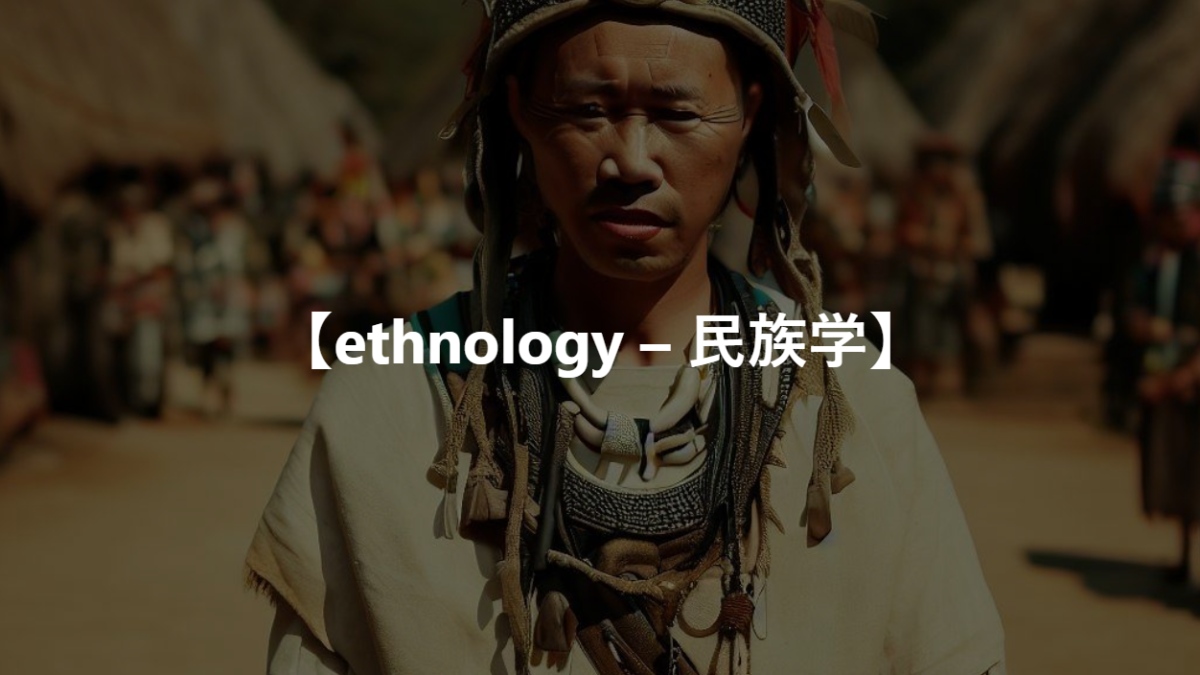語源・類義語・反対語・例文
【Ethnology – 民族学】という単語の語源とか由来を知っていますか?
「Ethnology」という単語は、ギリシャ語の「ethnos」(国民、人々)と「-logy」(研究の意)から来ています。従って、直訳すると「人々の研究」または「国民の研究」となります。これは人類学の一分野であり、特にあまり知られていない、または過去の異なる文化や民族の比較研究に焦点を当てています。民族学は、異なる民族集団の社会構造、習慣、伝統、文化的慣習を理解し、これらの要素が互いにどのように比較し、対照されるかを明らかにすることを目的としています。この用語は18世紀になって、学者たちが異なる人間社会の文化的側面を体系的に研究し始めた時に使用されるようになりました。
The word “ethnology” comes from the Greek words “ethnos,” meaning “nation” or “people,” and “-logy,” which means “the study of.” Therefore, ethnology literally translates to “the study of peoples” or “the study of nations.” It is a branch of anthropology that focuses on the comparative study of different cultures and peoples, especially those that are less known or from the past. Ethnology aims to understand the social structures, customs, traditions, and cultural practices of different ethnic groups and how these elements compare and contrast with each other. The term started to be used in the 18th century as scholars began systematically studying the cultural aspects of different human societies.
この単語の類義語・反対語を教えてください。
類義語:
- Anthropology: 人類学。広い意味で人間とその文化を研究する学問で、民族学はその一分野とされます。
- Cultural anthropology: 文化人類学。特に文化的な側面に焦点を当てる人類学の一分野で、民族学と密接に関連しています。
- Ethnography: 民族誌。特定の文化や民族集団に関する詳細な研究や記述を意味し、民族学の研究方法の一つです。
- Social anthropology: 社会人類学。社会の構造や関係を研究する人類学の一分野で、民族学と重なる部分が多いです。
反対語:
民族学に直接的な反対語は存在しませんが、異なる観点や焦点を持つ学問領域を考えることができます:
- Physical anthropology (Physical Biology): 体質人類学(生物人類学)。人間の生物学的、物理的側面を研究する人類学の分野で、文化や社会構造よりも、進化、遺伝学、解剖学に重点を置きます。
- Ethnocentrism: 民族中心主義。自分の文化や民族を他のものより優れていると見なす考え方で、民族学が求める文化間の理解や客観性とは対照的です。
この単語に似た単語で間違いやすい単語はありますか?
- Ethnography (民族誌): 民族学としばしば混同されますが、この用語は特定の文化や社会集団に関する詳細な観察と記述を指します。民族誌は、民族学的研究におけるデータ収集と分析の方法であり、実際のフィールドワークに基づいた具体的な研究活動を意味します。
- Ethology (動物行動学): 音が似ているために混同されることがありますが、完全に異なる分野です。動物行動学は、動物の行動を自然な環境で研究する生物学の一分野です。
- Ethnicity (民族性): これも「ethnology」と音が似ていますが、民族性は人々の文化的、言語的、または国家的アイデンティティを指します。民族学はこれらの集団を研究する学問であるため、混同されやすいです。
- Entomology (昆虫学): 音が非常に似ていますが、全く異なる意味を持ちます。昆虫学は昆虫の研究を行う生物学の分野です。
この単語を使った例文を5つほど教えてください。
Ethnology examines the cultural practices and belief systems of indigenous tribes around the world.
民族学は世界中の先住民族の文化的な慣習や信仰体系を研究します。
The ethnologist conducted fieldwork in a remote village to study the social structure of the community.
民族学者は遠隔の村でのフィールドワークを行い、コミュニティの社会構造を研究しました。
Ethnology helps us understand the diversity of human cultures and challenges ethnocentrism.
民族学は人類の文化の多様性を理解し、民族中心主義に対処するのに役立ちます。
The ethnographic research revealed fascinating insights into the rituals and traditions of the tribe.
民族誌学の研究は、その部族の儀式や伝統に関する魅力的な洞察を明らかにしました。
Ethnology plays a crucial role in preserving and promoting cultural heritage worldwide.
民族学は世界中の文化遺産の保存と促進に重要な役割を果たしています。
【ethnology – 民族学】のコロケーション
- Ethnology research (民族学研究): 民族学における研究活動を指します。文化、社会、言語など、特定の民族集団の特徴や生活様式に焦点を当てた学術的調査や分析を意味します。
- Ethnology studies (民族学研究): 民族学の学問分野における学習や研究を意味します。大学や研究機関で行われる、異なる文化集団を理解するための教育プログラムやコースのことを指します。
- Ethnology museum (民族学博物館): 民族学に関連する展示やコレクションを持つ博物館を指します。世界の様々な文化や民族の生活様式、衣装、道具、芸術などを展示し、文化的多様性を紹介する施設です。
- Field of ethnology (民族学の分野): 民族学が扱う研究の範囲や領域を意味します。人類学の一分野として、文化的、社会的な側面から人間とその行動を研究する学問領域です。
- Ethnology and anthropology (民族学と人類学): このコロケーションは、民族学と人類学という二つの関連分野を結びつけます。両者は密接に関連しているものの、人類学がより広い範囲を扱い、民族学は特に文化的な側面に焦点を当てた研究を指します。
「Ethnology – 民族学」とは、異なる文化や民族の生活様式、習慣、信仰などを研究する学問分野です。この分野は、人間の文化的多様性を理解し、異なる社会集団間の相互作用と発展を探求します。ここでは、「ethnology」に関連するいくつかの一般的なコロケーションとその説明について紹介します。
まず、「Ethnology research」、すなわち民族学研究は、特定の民族集団や文化に関する学術的な探求を指します。研究者たちは、フィールドワークや歴史的文献の分析を通じて、人々の生活方式や文化的慣習を詳細に調査します。
次に、「Ethnology studies」、または民族学研究は、この分野の学問的な学習や教育プログラムを指します。大学や研究所では、異なる文化的背景を持つ民族集団について学び、理解を深めるためのコースや講座が提供されます。
「Ethnology museum」、民族学博物館は、世界各地の民族的な衣装、工芸品、伝統芸術などを展示することで、文化的多様性を一般に紹介する施設です。これらの博物館は、異なる文化間の理解と尊重を促進する役割を果たします。
「Field of ethnology」、すなわち民族学の分野は、人類学の広い領域の中で、特に文化や社会構造に焦点を当てた研究領域を指します。この分野は、人間の文化的な側面を探求し、社会的な相互関係や文化間の比較を行います。
最後に、「Ethnology and anthropology」、民族学と人類学は、二つの密接に関連する学問領域を結びつけるコロケーションです。人類学は人間とその行動の総合的な研究を指し、民族学はその中でも特に文化的な要素に注目した分野です。
これらのコロケーションを通じて、民族学がいかに文化、教育、社会の文脈で重要な役割を果たすかが理解できます。民族学は、私たちが異なる文化的背景を持つ人々をより深く理解し、文化的多様性を学び尊重する上で不可欠な学問です。
“Ethnology,” also known as the study of cultures and ethnic groups, explores the diverse ways of life, customs, and beliefs of different human communities. This field seeks to understand cultural diversity and investigates the interactions and developments between different societal groups. Here, we introduce several common collocations associated with “ethnology” and their explanations.
First, “Ethnology research” refers to the academic exploration associated with specific ethnic groups or cultures. Researchers conduct detailed investigations into people’s ways of life and cultural customs through fieldwork or analysis of historical documents.
Next, “Ethnology studies” denote the academic study or educational programs in this field. Universities and research institutes offer courses and lectures to learn about and deepen understanding of ethnic groups with different cultural backgrounds.
“Ethnology museum,” or a museum of ethnology, is an institution that introduces cultural diversity to the public by exhibiting ethnic costumes, crafts, and traditional arts from around the world. These museums play a role in promoting understanding and respect among different cultures.
“Field of ethnology” refers to the area of study within anthropology that focuses specifically on cultural or social structures. This field explores the cultural aspects of humans, examining social relationships and comparative studies between cultures.
Lastly, the collocation “Ethnology and anthropology” links two closely related academic fields. While anthropology is the comprehensive study of humans and their behaviors, ethnology focuses more specifically on cultural elements within this broader field.
Through these collocations, we can understand how ethnology plays a vital role in the contexts of culture, education, and society. Ethnology is essential for deeper understanding and appreciation of people from diverse cultural backgrounds, promoting the study and respect for cultural diversity.
文法問題: “ethnology” (民族学)
- 品詞と使い方:
The anthropologist specialized in the field of _________, studying the customs and beliefs of various cultures.
(A) ethnology
(B) ethnologist
(C) ethnological
(D) ethnologically
解答と解説:
(A) ethnology 空欄には、前置詞 of の目的語となる名詞が必要です。ethnology は「民族学」という意味の名詞です。
– - 形容詞形:
The _________ study compared the social structures of different indigenous communities.
(A) ethnology
(B) ethnologist
(C) ethnological
(D) ethnologically
解答と解説:
(C) ethnological 空欄には名詞 study を修飾する形容詞が必要です。ethnological は「民族学的な」という意味の形容詞です。
– - 名詞形(人):
The _________ spent years living among the tribe, documenting their language and traditions.
(A) ethnology
(B) ethnologist
(C) ethnological
(D) ethnologically
解答と解説:
(B) ethnologist 空欄には主語となる名詞が必要です。ethnologist は「民族学者」という意味の名詞です。
– - 類義語:
The _________ research focused on the cultural practices and rituals of the ancient civilization.
(A) ethnology
(B) anthropology
(C) sociology
(D) ethnography
解答と解説:
(D) ethnography ethnology は民族の比較研究を指しますが、ここでは特定の文化の習慣や儀式に焦点を当てているため、「民族誌学」を意味する ethnography がより適切です。
– - 誤文訂正:
The ethnology department at the university offered a course on the history of human migration.
解答と解説:
ethnology department → anthropology department 人類の移動の歴史は、民族学よりも文化人類学の研究対象に近いので、anthropology department が適切です。

